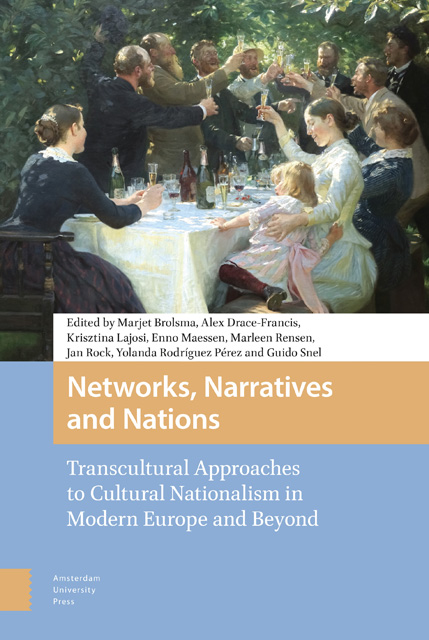 Networks, Narratives and Nations
Networks, Narratives and Nations Book contents
16 - Finding Oneself within Germania: Karl Viktor Mühlenhoff’s Reading of Widsith
Published online by Cambridge University Press: 16 November 2022
Summary
Abstract
The Old English poem Widsith was felt on publication to provide a valuable Germanic correlative to Tacitus's list of tribes in the Germania. This chapter studies a detailed if localized attempt to harmonize the two, with an evident agenda relating to the political status of Schleswig-Holstein.
Keywords: Germania; Beowulf; Widsith; Karl Viktor Mühlenhoff; Pan- Germanism; Schleswig-Holstein
In his seminal work National Thought in Europe, Joep Leerssen points out that Tacitus's Germania, rediscovered in 1455, was “to become the single most influential piece of Latin literature in post-medieval Europe.” The immediate reasons for its popularity among German scholars are obvious: it presented the ancient Germans as brave, stalwart, chaste and virtuous, praise which their descendants were very ready to claim as their own. Much more seriously influential was Tacitus's assertion, in chapter 2 of his work, that in his opinion the Germans were not only autochthonous but racially pure. The bad effects of this in the twentieth century need no emphasis here, but in the nineteenth century they added force to the desire to make Germany, or Deutschland, not only an ethnic or linguistic but also a political unity. Tacitus, one may say, gave ancient authority to the Bismarckian programme.
Nevertheless, the Germania suffered in scholarly German eyes from a major defect: it was ethnology from the outside. Its list of some fifty tribal names (depending on how many one was prepared to accept as Germanic) was mostly unrecognizable. The Frisii were certainly Frisians, the Suiones Swedes, the Suebi arguably Swabians. But who were the descendants of the Chamavi or Usipi, to take two names at random, and what did their names mean? It was a problem, but not, many felt, an insoluble one. For in the nineteenth century, scholars had for the first time at their disposal the formidable force of comparative philology – which they often called, looking back to the seminal work of Jacob Grimm in 1830, simply Grammatik. Some works, such as Kaspar Zeuss's Die Deutschen und die Nachbärstamme (The Germans and Neighbouring Tribes, 1837) considered the whole problem, while others attempted to trace the history of one tribe or another, the whole collective activity being eventually rolled up in Rudolf Much's long edition and commentary on Tacitus's Germania in 1937.
- Type
- Chapter
- Information
- Networks, Narratives and NationsTranscultural Approaches to Cultural Nationalism in Modern Europe and Beyond, pp. 203 - 210Publisher: Amsterdam University PressPrint publication year: 2022


